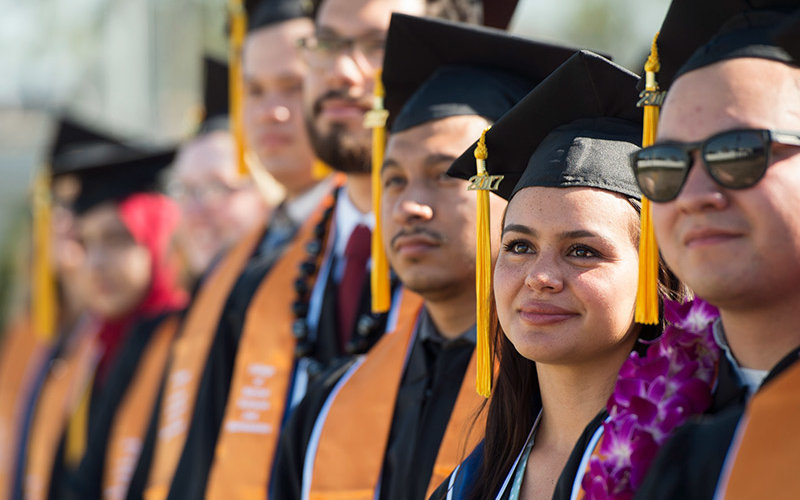
Cal State Fullerton is taking specific, actionable steps to increase timely graduation rates for first-time freshmen and transfer students while eliminating the opportunity gap for traditionally underrepresented students as part of California State University’s Graduation Initiative 2025.
Launched in January 2015, Graduation Initiative 2025 aims to increase by 2025 CSUF’s first-time freshmen four-year graduation rate from the current 22 percent to 44 percent, and transfer students’ two-year graduation rate from the current 32 percent to 44 percent. According to 2013 data from The Chronicle for Higher Education, the four-year graduation rate for all public colleges in California was 33.6 percent, and 64 percent in six years.
The systemwide initiative focuses on increasing freshmen and transfer-student graduation rates while eliminating the opportunity gap for the 475,000 students across all 23 CSU campuses. The goal is to add 100,000 more college graduates to California over the next 10 years to meet anticipated workforce demands.
At CSUF, student success initiatives started well before January 2015. The 2013-2018 Strategic Plan created an infrastructure for student success, which resulted in strides in advising, enrollment management and student services meant to eliminate obstacles, close the opportunity gap and ensure timely graduation for all students.
Calling for close collaboration across the divisions of Academic Affairs, Student Affairs, Information Technology, Administration and Finance, University Advancement, and Human Resources, Diversity and Inclusion, the infrastructure was pivotal in improving the six-year graduation rate by 12 percentage points — from 51 percent to an all-time high of 63 percent in 2016 — and cutting the opportunity gap for the freshman class in half to 6 percent while eliminating the gap entirely for transfer students.
In 2017-18, the focus is to increase graduation rates for all transfer students and freshmen who choose to and can graduate in two or four years, with the University’s support.
“At the same time, we also want to ensure that there is no decrease in the rigor or integrity of our academic programs,” said Pamella Oliver, interim associate vice president for academic programs. “For that reason, we are seeking broad-based faculty, staff and student input. While our goal is a four-year graduation rate, we also recognize individual differences that may make this less likely, and we want to do what is in the students’ best interests. That is why our target goal is only 44 percent by 2025. We will work closely with our students to help them overcome barriers or provide additional assistance.”
Clint-Michael Reneau, associate vice president for student affairs, said in addition to focusing on learning, retention and graduating students in a timely manner, the University also looks to ensure students’ overall well-being and supply them with an engaging college experience.
“Cal State Fullerton has a broad definition of student success,” Reneau said. “Students who are involved and engaged in high-impact practices, such as study abroad, research, internships, athletics, theater productions and many other ongoing programs, have a higher likelihood of graduation.”
One of the key components in empowering students to graduate in four years is pointing out that by finishing earlier, students have advantages in beginning their careers, graduate degrees, travel or volunteer work, Reneau said. He added that 15 credits cost the same as 12 credits, so there is a financial incentive to take 30 units per year. As part of Graduation Initiative 2025, the University recently increased from 16 to 18 the number of units students can register for per semester without obtaining additional approval.
“Student success teams from each of the University’s eight colleges, as well as task forces, are available to address barriers to graduation,” Reneau said.
If the barriers are financial, counselors can point students in the right direction for financial aid, grants and scholarships. For example, FAFSA (Free Application for Federal Student Aid), is used by nearly all colleges and universities to determine eligibility for federal, state and college-sponsored financial aid, including grants, educational loans and work-study programs. In fact, students may be eligible for grants that do not have to be paid back. With financial assistance, students can concentrate on their studies, work fewer hours and finish college faster.
Updated software also allows the University to transcribe and upload transcripts from 35 community colleges and universities, which gives transfer students an accurate record of their courses much quicker, improving their advisement. This reduces the number of additional classes that students may mistakenly take, which can delay their graduation.
“We’re here to help students. We’ve had student success teams that provide holistic advising to students,” said Reneau said. “Our message to students is, if you want to do this, we’re here to help.”
Faculty and staff also have submitted proposals and received innovation grants for programs or research related to increasing graduation rates and/or reducing opportunity gaps.
All campus divisions and departments are involved in helping CSUF meet its goal. A campuswide advisory group guides the work, while working groups focus on strategic enrollment management and administrative barriers; student success teams; wellness and belonging; high-impact practices (HIPs); first-year experience; bottleneck courses; data use, IT innovation and assessment; and academic preparation.
The campus community can find information about the University’s progress and share feedback with those working on the Graduation Initiative 2025 through the website, fullerton.edu/grad2025.
The 2017-18 Graduation Initiative 2025 Advisory Group will oversee the nine cross-campus working groups. Advisory Group members include:
Co-Chairs — Anil K. Puri, interim provost and vice president for academic affairs, and Berenecea Johnson Eanes, vice president for student affairs
Darren Bush – Student Affairs
Amir Dabirian – Information Technology
Audrey Eftychiou – Academic Affairs
Sheryl Fontaine – Academic Affairs
Marie Johnson – Academic Affairs
Karyn Scissum Gunn – Academic Affairs
Deanna Leone – Student Affairs
Pamella Oliver – Academic Affairs
Tonantzin Oseguera – Student Affairs
Daniel Ramirez – Student Affairs
Clint-Michael Reneau – Student Affairs
Su Swarat – Academic Affairs
Mary Ann Villarreal – Academic Affairs